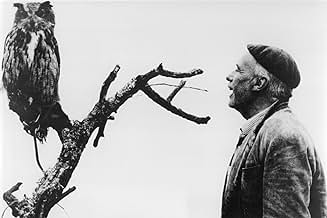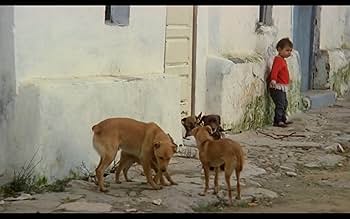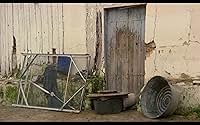VALUTAZIONE IMDb
8,1/10
5095
LA TUA VALUTAZIONE
Aggiungi una trama nella tua linguaSpain, 1960s. The family of poor farmers work hard in the countryside for the rich landowners who exploit them.Spain, 1960s. The family of poor farmers work hard in the countryside for the rich landowners who exploit them.Spain, 1960s. The family of poor farmers work hard in the countryside for the rich landowners who exploit them.
- Regia
- Sceneggiatura
- Star
- Premi
- 6 vittorie e 4 candidature totali
Pepín Salvador
- Obispo
- (as José Salvador)
Recensioni in evidenza
10erwinoz
If I would believe in a god who created man as his equal, Mario Camus would be one of the first people to come in mind to make me understand how powerful that god must be. 'Los santos inocentes' is a masterpiece of European cinema. The movie brings us back to times in Spain where most people were nothing more than property of the few rich. The 'master' even had the right to be the one to make the daughters of his serfs lose their virginity. A man and wife living such a cruel life, with trouble enough of their own, still open up their house for the wife's brother Azarias (Francisco Rabal), when he -at old age- loses his job. And Rabal gives us a performance of simplicity and joy that we will never ever forget. Although I've heard of people who found it difficult to see the beauty through all the misery, to me this is one of the most beautiful movies I've ever seen. Possibly also the very best.
The last twenty five years of Spanish filmography have produced a number of titles which have indulged in sociological themes, mostly using the years of the Franco Régime as a background when not a mere scapegoat. El Sur (Victor Erice)(qv), Las Ratas (Giménez Rico)(qv), Las Bicicletas son para el Verano (Jaime Chávarri) as well as several by the now deceased Pilar Miró, come to mind. But perhaps none reach the powerful endorsement achieved in Los Santos Inocentes, carefully and predictably directed by Mario Camus. Faithfully transferred from the book by Miguel Delibes, also author of Las Ratas, as well as singularly impressive narratives such as Cinco Horas con Mario, a true tour de force in contemporary literature, and the intensely lyrical and moving El Camino, Camus inspired the principal actors - Paco Rabal, Alfredo Landa and Terele Pávez - into producing some memorable scenes.
Scenes of illiterate peasants obeying their master, landowner, insensible to everything except his passion for hunting; peasants who were so hugely grateful for the handful of pennies so compassionately handed out by the rich duchess; peasants who grovelled in the filth of their mean shack and could barely write their own names. Spain: about 1962 if the registration number of the big black Mercedes is anything to go by. Spain, in the region called Extremadura, which even today is the poorest part of the country. Spain, governed by a dictator who himself was extremely uncultured.
Camus, armed with the simple but sincere exposition in Delibes' novel, manages to show this plight, but without the tremendism so frequent in Spanish books or films; without any soured feelings, but dispassionately, like a surgeon operating for the five hundredth time on gall-stones. The story was there to be told and not sympathized over. Not for the pop-corn eating public, more for the discerning cinema-goer who can give what the film demands: attention to details. The incision is precise, exact, giving greater credibility to this little masterpiece.
Scenes of illiterate peasants obeying their master, landowner, insensible to everything except his passion for hunting; peasants who were so hugely grateful for the handful of pennies so compassionately handed out by the rich duchess; peasants who grovelled in the filth of their mean shack and could barely write their own names. Spain: about 1962 if the registration number of the big black Mercedes is anything to go by. Spain, in the region called Extremadura, which even today is the poorest part of the country. Spain, governed by a dictator who himself was extremely uncultured.
Camus, armed with the simple but sincere exposition in Delibes' novel, manages to show this plight, but without the tremendism so frequent in Spanish books or films; without any soured feelings, but dispassionately, like a surgeon operating for the five hundredth time on gall-stones. The story was there to be told and not sympathized over. Not for the pop-corn eating public, more for the discerning cinema-goer who can give what the film demands: attention to details. The incision is precise, exact, giving greater credibility to this little masterpiece.
Back to the beginning of the 20th century, the countryside of the Iberian peninsula was controlled by land tenants who enjoyed a set of privileges that would be considered more typical of the middle ages than of modern times. As for example, having enslaved families working on their farms.
Now this is obviously an issue that 2 actual European Union countries like Spain and Portugal don't like to be reminded of. Nobody likes to remember that less than 50 years ago this was still a reality. So with time it became a non-issue, an unsponsored reality.
What Camus does with this movie is remarkable. Not only by his technique and the end result of this film, but mainly because it gives voice - and more importantly, it gives images - to this hundred of anonymous stories that were never portrayed before with such care.
A must see.
Now this is obviously an issue that 2 actual European Union countries like Spain and Portugal don't like to be reminded of. Nobody likes to remember that less than 50 years ago this was still a reality. So with time it became a non-issue, an unsponsored reality.
What Camus does with this movie is remarkable. Not only by his technique and the end result of this film, but mainly because it gives voice - and more importantly, it gives images - to this hundred of anonymous stories that were never portrayed before with such care.
A must see.
This is one of the best Spanish movies I have seen. For many reasons. First, the story, which is based on a great novel by the brilliant writer Miguel Delibes, can be seen from different points of view: as the characters in themselves, or as the history of the spanish society through two generations. Second, the actors do an incredible performance (Paco Rabal and Alfredo Landa are really fantastic, not to mention Juan Diego, Mary Carrillo, Terele Pávez...). Third, the scenes' directing and editing rise to the occasion. The result is a fresh, intelligent and charming film that we won't forget for a long time. Perhaps Belén Ballesteros and Juan Sachez's performances aren't worthy of the occasion, but that's the least of my worries.
The DVD I received from Corte Ingles includes a trailer for "Boda de Sangre" (Lorca) and this film is similar in spirit, but with even greater tension. This story is reminiscent of Cela's "Familia Duarte", and indeed the DVD includes a trailer to Cela's "Colmena" also, though I haven't seen that film.
I agree with the strong evaluations and comments of other viewers. I'll add that I enjoyed the handling of time in the film, through intermittent flashbacks and juxtapositions of modern elements - e.g., the automobiles driven by the landowners - with the nearly stone-age level of the protagonist family.
Yet for me, the level of dramatic tension became, frankly, too great to bear. I don't know how I could have handled it in a theater. Given I had mouse control, I interrupted it a few times for relief. Then, about two-thirds through, I forwarded the film to see the end. There are occasions when social realism can produce a tale of social horror harder to watch and bear than anything Hollywood's chainsaw boys ever dreamed of.
The acting and cinematography are excellent. I can imagine viewers trying to laugh at Azarias' (Francisco Rabal) rustic charm. His performance is unforgettable - especially as he, like a hand of fate (azar) delivers the much-needed catharsis near the end - but I, and I presume most, will surely view him as a charming and touching victim, fleeing reality to the extent his old age permits - until a certain cruel act drives him to action.
I would have preferred a balancing of the harshness of this film with more moments of beauty to serve as relief, as in the French Manon (e.g., Jean de Florette) films. But here, the actual social conditions were far harsher - "epoca negra" stuff at its worst - and I presume that to add such relief would have been untrue to history. For me, Familia Duarte and Boda de Sangre sufficed.
I will conclude in recommending some of Delibes' recent works. He has a wonderful sense of humor and a great versatility of style that enables him to relate even everyday events in the most charming and entertaining way. It's hard to believe that the same man who wrote Santos Inocentes also wrote "Diario de un Jubilado" and "Mis Amigas las Truchas" or "Las Perdices de Domingo". And hard to believe how far Spain and Europe have come.
I agree with the strong evaluations and comments of other viewers. I'll add that I enjoyed the handling of time in the film, through intermittent flashbacks and juxtapositions of modern elements - e.g., the automobiles driven by the landowners - with the nearly stone-age level of the protagonist family.
Yet for me, the level of dramatic tension became, frankly, too great to bear. I don't know how I could have handled it in a theater. Given I had mouse control, I interrupted it a few times for relief. Then, about two-thirds through, I forwarded the film to see the end. There are occasions when social realism can produce a tale of social horror harder to watch and bear than anything Hollywood's chainsaw boys ever dreamed of.
The acting and cinematography are excellent. I can imagine viewers trying to laugh at Azarias' (Francisco Rabal) rustic charm. His performance is unforgettable - especially as he, like a hand of fate (azar) delivers the much-needed catharsis near the end - but I, and I presume most, will surely view him as a charming and touching victim, fleeing reality to the extent his old age permits - until a certain cruel act drives him to action.
I would have preferred a balancing of the harshness of this film with more moments of beauty to serve as relief, as in the French Manon (e.g., Jean de Florette) films. But here, the actual social conditions were far harsher - "epoca negra" stuff at its worst - and I presume that to add such relief would have been untrue to history. For me, Familia Duarte and Boda de Sangre sufficed.
I will conclude in recommending some of Delibes' recent works. He has a wonderful sense of humor and a great versatility of style that enables him to relate even everyday events in the most charming and entertaining way. It's hard to believe that the same man who wrote Santos Inocentes also wrote "Diario de un Jubilado" and "Mis Amigas las Truchas" or "Las Perdices de Domingo". And hard to believe how far Spain and Europe have come.
Lo sapevi?
- QuizVoted eighth best Spanish film by professionals and critics in 1996 Spanish cinema centenary.
- ConnessioniFeatured in ¡Qué grande es el cine!: Los santos inocentes (1996)
I più visti
Accedi per valutare e creare un elenco di titoli salvati per ottenere consigli personalizzati
- How long is The Holy Innocents?Powered by Alexa
Dettagli
- Data di uscita
- Paese di origine
- Sito ufficiale
- Lingua
- Celebre anche come
- The Holy Innocents
- Luoghi delle riprese
- Aziende produttrici
- Vedi altri crediti dell’azienda su IMDbPro
- Tempo di esecuzione
- 1h 47min(107 min)
- Colore
- Mix di suoni
- Proporzioni
- 1.66 : 1
- 1.78 : 1
Contribuisci a questa pagina
Suggerisci una modifica o aggiungi i contenuti mancanti

![Guarda Tráiler [OV]](https://m.media-amazon.com/images/M/MV5BMDA4ZTRjZjktOTJjYi00MGRlLWE3NDktYzgzNDAyYjk4NjY5XkEyXkFqcGdeQXRyYW5zY29kZS13b3JrZmxvdw@@._V1_QL75_UX500_CR0)




























